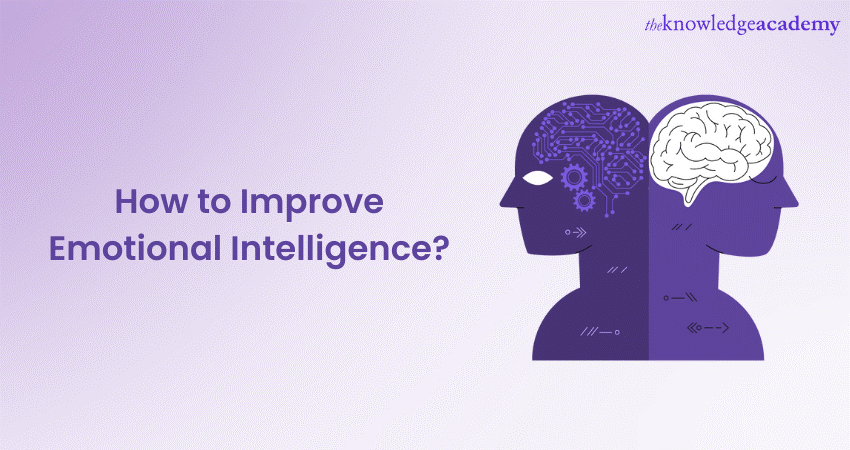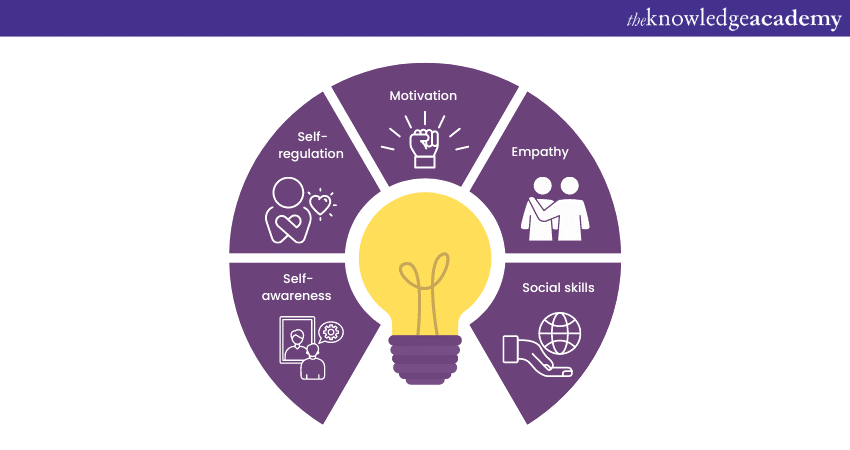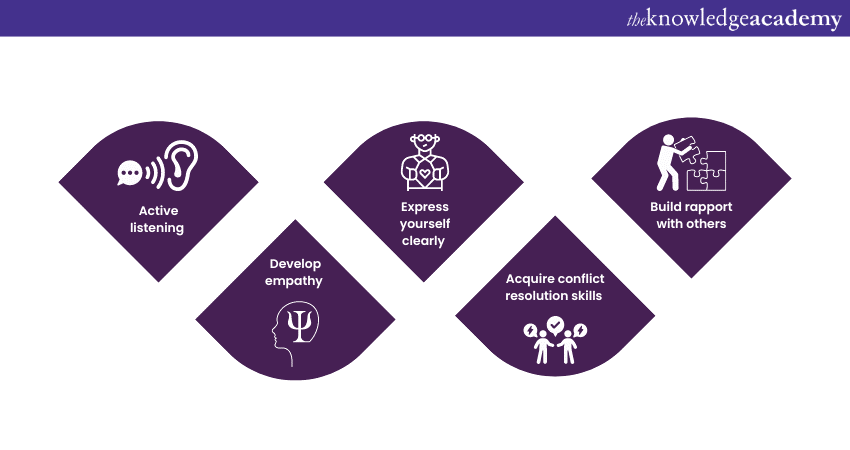We may not have the course you’re looking for. If you enquire or give us a call on 01344203999 and speak to our training experts, we may still be able to help with your training requirements.
Training Outcomes Within Your Budget!
We ensure quality, budget-alignment, and timely delivery by our expert instructors.

Emotional Intelligence is crucial for human interaction, shaping how we perceive, understand, and manage emotions in ourselves and others. By understanding How to Improve Emotional Intelligence, you can navigate life's challenges with resilience and empathy.
According to Statista, 80 per cent of millennials reported that training sessions are the most effective method to acquire Emotional Intelligence skills.
If you too are looking for the same, the this blog is for you. Explore this blog on How To Improve Emotional Intelligence and learn about its importance. Also, learn effective ways to enhance this skill to foster good bonds.
Table of Contents
1) Why is Emotional Intelligence important?
2) Components of Emotional Intelligence
3) Steps to Improve Emotional Intelligence
4) Conclusion
Why is Emotional Intelligence important?
Emotional Intelligence is a vital skill that aids individuals as they navigate the various crucial relationships in their life. As they acquire the ability to be self-aware of their emotional experiences, they learn to express them in a healthy manner.
This helps them have a greater chance at success in both personal and professional ways of life. Moreover, acquiring more understanding about Emotional Intelligence can also assist them in developing their skills to achieve success in any role.
Furthermore, individuals can benefit from acquiring Emotional Intelligence skills by fostering more important relationships with their colleagues or collaborators. Such skill can also help them thrive in complex social scenarios that require a clear understanding of perspectives and feelings of various individuals.
More importantly, being emotionally intelligent and resilient leads to minimising any negative effects. This happens by recognising patterns in emotions and devising helpful strategies to tackle any uncomfortable feelings. Possessing Emotional Intelligence can equip an individual to be completely career ready, wherein skills like managing one’s self, being self-motivated and empathetic can give them an upper-hand in the competitive market.
Components of Emotional Intelligence
Emotional Intelligence consists of several key elements that collectively contribute to our ability to understand and manage emotions effectively. Here are the essential components of How to Improve Emotional Intelligence:

1) Self-awareness: Individuals can develop the skill to identify and comprehend their own emotions. They can become aware of the impact their emotions have on others. Self-awareness is essentially the foundation of Emotional Intelligence and other facets of this ability rely on self-awareness. Emotions and behaviours become more manageable once individuals are very well aware of the behaviours triggered from emotions experienced. Now this element involves recognising and understanding one's own emotions, thoughts, and behavioural patterns. Self-awareness allows individuals to identify their emotional triggers and how emotions influence their decision-making.
It is worth noting that individuals who are more self-aware are generally more confident and also creatively active. They tend to make better-informed decisions, nurture better relationships and communicate more effectively.
2) Self-regulation: Self-regulation is the process of controlling and managing emotions in various situations. It involves staying composed and calm during challenging times, avoiding impulsive reactions, and responding thoughtfully to emotions. This ability is activated by self-awareness,can keep their disruptive impulses in check. More importantly, individuals able to self-regulate typically maintain a positive perspective towards their lives. They are very adaptable to various scenarios and circumstances. Whereas those that are unable to handle their negative emotions usually tend to trigger negative emotions in others.
3) Empathy: Empathy is the ability to understand as well as share the feelings of others. It involves being attuned to others' emotions, being able to perceive their perspectives, and responding with compassion and understanding. Now such an ability is of vital use when attempting to foster an emotional connection with other individuals. Practicing such a skill helps professionals anticipate the requirements and reactions of others. Moreover, in the modern workplace, managers that are emotionally attuned and intelligent are capable of assembling diverse teams. Such teams comprise of unique outlooks and strengths which can be leveraged for the business process.
4) Social skills: Social skills include various abilities related to interpersonal interactions. These skills include effective communication, active listening, conflict resolution, teamwork, and building positive relationships.
These key elements of Emotional Intelligence work together to shape how individuals perceive and manage emotions, navigate social interactions, and form meaningful connections with others. Developing these elements can lead to greater self-awareness, healthier relationships, and improved overall well-being.
Steps to Improve Emotional Intelligence
Emotional Intelligence is a valuable skill that has a massive role in our personal and professional lives. It involves understanding and managing emotions effectively, as well as being empathetic towards others. Improving Emotional Intelligence can lead to better relationships, effective communication, and overall well-being. Here are the steps on How to Improve Emotional Intelligence:
Practice self-awareness
Self-awareness is the foundation of Emotional Intelligence. Take time each day for self-reflection. Pay attention to your emotions without judgment. Identify patterns in your emotional responses and the triggers that elicit certain feelings. Journaling can be a helpful tool to track your emotional experiences and gain insights into your thought processes.
Journaling is typically of a few types, namely reflective, gratitude, stream-of-consciousness, dream and creative. Reflective journaling is a structured style of writing that helps individuals obtain clarity around discomforting events.
It can help them get out of an emotional rut and activate a more creative thinking process. For example, an individual can initiate practice by penning down an uncomfortable or puzzling event. They can also log down an important life memory, asking themselves questions such as:
a) What happened?
b) How did i manage to respond?
c) What would i have done or said alternatively?
d) What changes did the experience bring about in me?
Writing the answers in detail to the above questions and other possible ones can provide valuable insight into how the individual responds to stressful situations. They can further work on how they can respond in a healthier way.
Develop self-regulation
Once you are more aware of your emotions, work on developing self-regulation. It is one of the most effective ways to improve Emotional Intelligence. When faced with challenging situations, pause and take deep breaths before responding. This brief moment of reflection can prevent impulsive reactions driven by strong emotions. Learn to express your feelings constructively, finding healthy outlets like engaging in physical activities or talking to a friend.
Practice Active Listening
Empathy is about understanding others on a deeper level. Practice active listening by providing your full attention to the speaker without interrupting. Try to imagine what the other person might be feeling or going through. Engaging in open and honest conversations can develop a safe space for others to share their emotions and experiences.
Additionally, practice playing close attention to another person’s body language and their vocal tone and pace. Noticing such details can help an individual recognise the emotional state of the speaker and any subtextual messages behind what they are actually expressing.
You can practice Active Listening by letting the other person flow through their train of thought without any interruptions. Such a practice helps facilitate free and healthy communication and fosters an environment of trust and acceptance.
Moreover, Active Listening can be practiced better by maintaining control over internal and external distractions. Recognising the need to plan your responses will enable you to be completely mindful and grounded to the present moment.
Practice self-motivation
Maintaining a positive outlook can enhance Emotional Intelligence. Focus on your strengths and achievements, celebrating your successes no matter how small they may seem. Set realistic goals and break them down into manageable steps. Reward yourself for accomplishing milestones along the way, reinforcing positive behaviours.
Enhance social skills

Improving social skills allows you to navigate various social interactions effectively. Pay attention to nonverbal cues like body language and facial expressions during conversations. Practice assertive communication by expressing your needs and feelings clearly while respecting others' boundaries. Be mindful of the tone of your voice and your choice of words to convey empathy and understanding.
Be open-minded
Individuals that are emotionally intelligent are those who are usually easy to approach because of their excellent listening skills. They possess the ability to consider and comprehend new and diverse perspectives. More importantly, they are enthusiastic and passionate about learning new ideas or concepts and are courageous to envision what the output may look like if implemented into the daily work.
Practice mindfulness
Incorporate mindfulness practices into your daily routine. Find a quiet space and focus on your breath, allowing thoughts to come and go without judgment. Mindfulness helps you stay present, reducing stress and anxiety and allowing for more thoughtful responses to challenging situations.
Manage stress effectively
Stress can be detrimental to Emotional Intelligence. Identify your stressors and create healthy coping strategies. Regular exercise, spending time in nature, or engaging in hobbies can help reduce stress levels. Don't hesitate to seek support from friends, family, or a professional if you find yourself overwhelmed.
Seek feedback and learn
Be open to feedback from others about your emotional interactions. Constructive criticism can be an extremely valuable tool for self-improvement. Avoid becoming defensive and, instead, view feedback as an opportunity to grow and become more emotionally intelligent.
A healthy and constructive approach to seeking feedback starts from practicing the ability to first listen, analyse the feedback and ask questions. It is possible to own the feedback by being open-minded and making a note of it. Being accepting of feedback helps the mind ponder and wrap itself around what has been expressed.
It is especially vital to follow up on the feedback to effectively adopt a mindset of growth. Once you have practised asking questions, you can start asking better questions. The quality and richness of the questions come with practice and determination. More importantly, it is recommended that you recognise your goals behind asking the feedback, followed by recognising who to consult for feedback.
Feedback comprises of compliments and criticism. Individuals must learn to accept both graciously and reflect on the feedback received. They must also be aware of “if and when” they overreact to any feedback and follow up with the conveyor to evaluate the progress made since the feedback.
Enhance your Emotional Intelligence with our Emotional Intelligence Training. Sign up today!
Conclusion
We hope you read and understand How to Improve Emotional Intelligence. Emotional Intelligence is an essential skill for effective leadership. Leaders who embrace Emotional Intelligence foster trust, empathy, and open communication. This supportive environment empowers their team to thrive and achieve exceptional results.
Unlock your potential and cultivate personal growth today with our transformative Personal Development Training – sign up now!
Frequently Asked Questions

Yes, improved Emotional Intelligence can significantly enhance career advancement. Individuals with high Emotional Intelligence are better equipped to navigate workplace dynamics, build strong relationships, communicate effectively, and manage conflicts. These skills can lead to increased leadership opportunities and faster career progression.

Enhancing Emotional Intelligence can lead to promotions by enabling individuals to foster positive relationships, communicate effectively, and demonstrate strong leadership qualities. Additionally, they excel in conflict resolution and problem-solving, leading to improved team dynamics and higher productivity.

The Knowledge Academy takes global learning to new heights, offering over 30,000 online courses across 490+ locations in 220 countries. This expansive reach ensures accessibility and convenience for learners worldwide.
Alongside our diverse Online Course Catalogue, encompassing 17 major categories, we go the extra mile by providing a plethora of free educational Online Resources like News updates, Blogs, videos, webinars, and interview questions. Tailoring learning experiences further, professionals can maximise value with customisable Course Bundles of TKA.

The Knowledge Academy’s Knowledge Pass, a prepaid voucher, adds another layer of flexibility, allowing course bookings over a 12-month period. Join us on a journey where education knows no bounds.

The Knowledge Academy offers various Personal Development Courses, including Time Management Training, Attention Management Training and Active Listening Training. These courses cater to different skill levels, providing comprehensive insights into Striking the Right Balance between Confidence vs Arrogance.
Our Personal Development Blogs cover a range of topics related to Emotional Intelligence, offering valuable resources, best practices, and industry insights. Whether you are a beginner or looking to advance your Business skills, The Knowledge Academy's diverse courses and informative blogs have you covered.
Upcoming Business Skills Resources Batches & Dates
Date
 Emotional Intelligence Training
Emotional Intelligence Training
Fri 10th Jan 2025
Fri 14th Mar 2025
Fri 9th May 2025
Fri 11th Jul 2025
Fri 12th Sep 2025
Fri 14th Nov 2025







 Top Rated Course
Top Rated Course



 If you wish to make any changes to your course, please
If you wish to make any changes to your course, please


